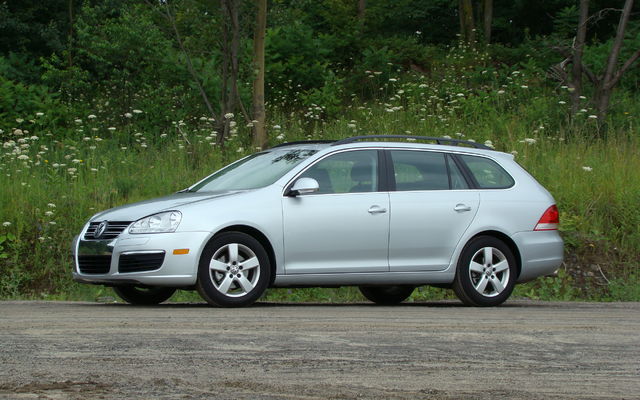Volkswagen Jetta wagon 2009: A category all its own!

It’s no secret that the automobile market consists largely of products that are not made with you directly in mind. That vehicles are made to please American tastes should come as no surprise given that more cars are sold in a few weeks in the United States than are sold in Canada in a year. Canadians are left with products that are neither dear to our hearts nor very profitable for manufacturers because of the small size or our market.
This has lead not only to the recent disappearance of many compact hatchbacks (although they are quietly making a comeback) but also to the almost total extinction of the compact wagon category in Canada, a category of cars that has proven to be incredibly successful everywhere else in the world. In fact, you could even count the remaining models of intermediate cars on one hand and still have some fingers to spare.
Read also
Volkswagen, however, is one of the rare manufacturers (along with Subaru) that continues to offer wagons. And why not? The market is theirs for the taking. In fact, while the Passat has to slug it out with other models in the intermediate category, the newly arrived Jetta finds itself alone as the only true compact wagon currently offered on the North American market. The Chevrolet Optra and Ford Focus were offered in this category until very recently, but much to the dismay of Quebec dealerships, they were effectively taken off the market in 2008 leaving the category the sole domain of the fifth generation Jetta, known as the Golf on other continents.
A true family wagon
Those of you who consider models like the Matrix, the Mazda3 Sport and the PT Cruiser as wagons would no doubt object to my previous statement, but truth be told, each of these more stylish cars offers barely more than half of the cargo space that you’d find in a real wagon like the Jetta. It is even more spacious than many compact SUVs and allows you to load bigger items because of its more traditional shape.
Granted, the shape of the new Jetta wagon is not as practical as it was in previous generations. Its somewhat tilted hatchback and the more unorthodox shape of its side windows give the vehicle more modern and, some would say more elegant, lines. Personally, I’m not gaga over this design, but I was never really crazy about the design of the most recent Jetta sedan either.
As expected, the driver’s position is in every way identical to that of the Jetta sedan. Thus, the finish is superb, the presentation is meticulous, the conveniences are numerous, and the driving position is optimal. The seats themselves could not be more comfortable or more supportive, and there is room for three to ride comfortably in the back. There is more good news when it comes to leg room, which is vastly superior to what VW was offering in the previous generation.
Slow sales
The dealerships are the first to admit that sales of the new Jetta wagon have been slower than expected. In fact, most buyers only have eyes for the version equipped with the TDI engine that will soon be made available. This 2.0-litre turbo-diesel engine will offer 140 horsepower and a torque that will make your hair stand on end, and given that it should not consume more than six litres per 100 kilometres, it’s easy to understand why it’s so eagerly anticipated.
For now, only the five cylinder 2.5-litre gas engine is offered, which has a rougher output but a generous torque. As for power, we would have expected better from the 170-horsepower engine, especially since it is paired with two very good transmissions. The first, of course, is a five-speed manual, while for a cool $1,400 more, you can opt for the six-speed automatic with Tiptronic mode. It turns out that the main problem with this five-cylinder engine - which is not offered on the European market by the way – is fuel consumption. Heavier than a Rabbit, you have to expect this Jetta to consume 10 litres per 100 kilometres on average, and even more of course, if you do a lot of city driving.
With the TDI engine on the way, my advice is to wait for it to arrive before setting your heart on this model. This way, you will be in a position to compare the output of the two engines, the price difference, and to calculate the total cost after a few years of use. Figuring a fuel consumption difference of 4 litres or about $5 per 100 kilometres, it should not take very long for the TDI engine to pay for itself. At the same time, engine maintenance will prove a little more costly with this choice.
A great touring car
The Jetta is a great touring car, and boasts an excellent suspension, quick and precise steering, a very good braking system and especially, an extremely rigid chassis. The predictable result is an exceedingly dynamic ride, surprising stability and guaranteed fun behind the wheel. It’s not surprising that you are so often reined back in by the odometer, whose red needle easily finds its way to the forbidden zone.
From a financial standpoint, the Jetta wagon is not as appealing as the Focus, which has left many to mourn its disappearance, but its price is still far more attractive than that of the older generation Jetta, and its quality is far superior. Compared to its predecessor, it is an excellent deal. In any case, if you already have your heart set on a compact wagon, we can agree that the choices are rather limited.









